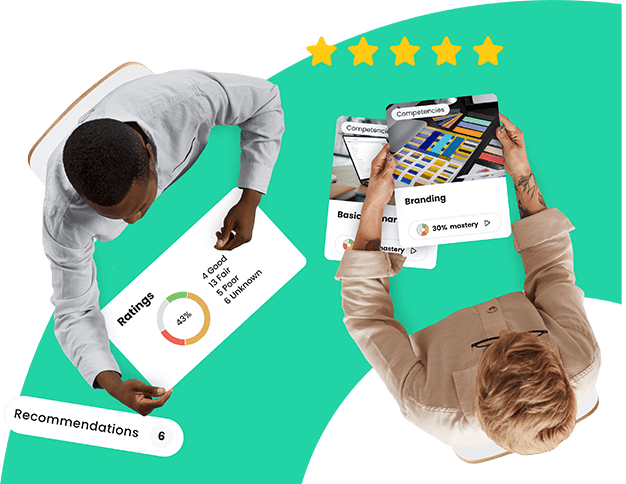Skills development glossary & common definitions

Bridge the gap between potential and expertise with our Skills Development Glossary. As the landscape of professional competencies continuously evolves, fueling progress in areas like Workforce Development and Upskilling is a nonstop job. Learn how LMS resources like Talent Development, Personalized Learning, Skills Gap Assessments, and Learning Pathways give learners the ability to gain the hard skills that shape their career paths.
Evaluation method gathering feedback from multiple sources, including supervisors, peers, subordinates, and self-assessment, to provide a comprehensive performance view.
The sequence of job roles and positions an individual progresses through in their career.
Structured routes or trajectories outlining stages of career progression, often involving roles with increasing responsibilities.
A predefined route that individuals can follow within an organization to advance their careers, often involving different roles, responsibilities, and skill development.
A specific combination of skills, knowledge, and behaviors that enables an individual to excel in a particular role or profession.
An educational approach emphasizing the mastery of specific competencies or skills rather than completing a set timeframe.
The difference between existing skills and competencies and those required for optimal performance and career advancement.
A framework defining the skills, behaviors, and knowledge required for success in a particular role or profession.
Organizational initiatives and programs supporting continuous learning and skill development among employees.
More Corporate learning
Developing skills outside one's primary expertise or role to enhance versatility and adaptability.
More Cross-skilling
The acquisition of knowledge, skill, or attitude that prepares people for new directions or responsibilities. It may also refer to the third phase in ADDIE, in which training materials and content are selected and developed based on learning objectives.
More Development
Educational programs increasing awareness and understanding of diversity-related issues, fostering an inclusive work environment.
More Diversity training
The continuous process of acquiring, honing, and applying new or existing skills to enhance job performance and adapt to evolving work demands.
More Employee development
Personalized coaching for executives to enhance leadership skills, decision-making, and overall professional effectiveness.
More Executive coaching
LMS platforms often include feedback mechanisms, facilitating regular communication between learners and supervisors or peers.
Ongoing assessments during the learning process to provide immediate feedback and guide further instruction.
More Formative assessment
Concrete, teachable abilities or knowledge specific to a job or industry, often quantifiable and measurable.
The process of orienting and integrating new employees into the organization, emphasizing skill development, cultural assimilation, and job-specific training.
A clear statement defining the knowledge or skills learners are expected to gain from a learning activity.
The specific knowledge or skills learners are expected to acquire.
A curated and structured sequence of courses & modules designed to guide learners through a personalized learning journey with emphasis on the learners' control of choice.
More Learning path
A structured and personalized sequence of learning activities guiding individuals in acquiring specific skills and competencies.
A developmental partnership where an experienced individual (mentor) guides and supports a less experienced individual (mentee) in their career and skill development.
More Mentorship
Process of identifying areas for improvement in skills, knowledge, and performance within an organization.
Practical training that occurs in the actual work environment, providing hands-on experience and specific skills relevant to job responsibilities.
Tailoring educational approaches to meet the diverse needs, interests, and abilities of individual learners.
Essential skills, including communication, adaptability, and critical thinking, contributing to workplace effectiveness.
Initiatives and activities designed to enhance an individual's professional skills, knowledge, and overall effectiveness within their role.
Where instructors and students interact in a specific virtual place, through a specific online medium, at a specific time.
Learning new skills or obtaining different qualifications to transition into a new role or industry.
More Reskilling
Updating or refreshing an individual's skills to align with changing job requirements or industry advancements.
The continuous process of acquiring, honing, and applying new or existing skills to enhance job performance and adapt to evolving work demands.
More Skill development
The level of mastery or expertise an individual has in a specific skill, often assessed by real-world performance.
More Skill proficiency
Discrepancy between current employee skills and those required for organizational goals.
More Skills gap
Interpersonal attributes, including communication, teamwork, and problem-solving, essential for effective collaboration and success in the workplace.
An educational approach that establishes clear learning standards and expectations to ensure consistency and alignment with defined benchmarks.
Evaluation at the end of an instructional period to measure student competency levels.
LMS can aid in identifying and developing future leaders by offering targeted training programs and tracking the progress of high-potential employees.
If you’re new to the world of learning management systems, the common language and acronyms used daily can easily become overwhelming.
A strategic approach to attracting, retaining, and developing employees by providing opportunities for skill enhancement and career growth.
More Talent development
An integrated software solution supporting various aspects of talent management, including recruitment, training, performance management, and succession planning.
Learning new skills or acquiring additional qualifications to stay relevant in a current role or progress within the same field.
More Upskilling
Strategic initiatives focused on enhancing the skills, productivity, and employability of the workforce.
See how CYPHER is reshaping the meaning of personalized skills development and training, and how you can experience it for yourself.





